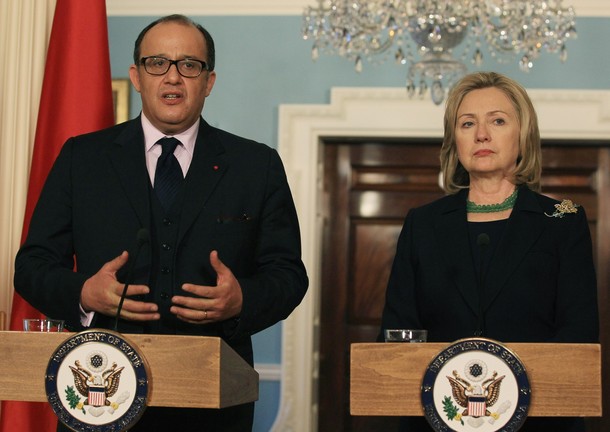As the cloud of uncertainty continues to hover North Africa—with the ultimate outcomes of the revolutions in Tunisia and Egypt still to be determined and unrest spreading in Algeria, especially in the Kabylie region, to say nothing of the fate of the revolt in Libya—it is somewhat befuddling that the Obama administration has not done more to secure our interests in the region by supporting the one country in North Africa is not in crisis and offers it the opportunity advance U.S. interests in this uncertain, but nonetheless increasingly vital region.
The recent visit to Washington by Moroccan Foreign Minister Taieb Fassi Fihri was a reminder that, amid the upheaval across North Africa and the Middle East, there are countries which have managed to avoid the turmoil precisely because they had already embraced the reform agenda. Moreover, as the Foreign Minister made clear, Morocco is indeed eager to partner with the United States to pursue common interests in stability and good governance.
In his meetings with Secretary of State Hillary Rodham Clinton and other senior officials, and in speeches to packed audiences at the Brookings Institution and the National Press Club (as well as during a high-level roundtable discussion at the Atlantic Council), Fassi Fihri’s message was clear: Morocco is accelerating its decades-old process of political and social renewal through precedent-setting constitutional and institutional reforms announced last month by King Mohammed VI. He also called upon the United States to be bolder in its approach to the region and to partner with allies in Europe to support democratic reformers in order to marginalize extremists who are desperately trying to secure a foothold amid the crisis and turn the unrest to their advantage.
Already Morocco and its neighbors have been experiencing an uptick in pressure from al-Qaeda in the Islamic Maghreb (AQIM), other extremists groups, and arms traffickers, who are seizing weapons from depots in the Libyan interior abandoned by regime forces as they deployed to battlefields along the coast. Moreover, Morocco continues to face threats from the Polisario separatist movement, founded and backed by Algeria with Muammar Qadhafi’s assistance, whose members are growing links to the traffickers and South American drug cartels that are turning the region into an ungoverned space of rising terrorism and criminal activities—where local and global jihadists are forming alliances that threaten not only regional stability, but the security of Europe and North America.
The key to supporting Morocco’s reform efforts is to remove the final obstacle to its internal stability—the now nearly four-decades-old Western Sahara conflict. A concerned bipartisan majority of the U.S. Congress has been urging the Obama administration for over two years to get behind the Moroccan plan to resolve the longstanding impasse over the Western Sahara. This proposed solution offers a real autonomy under Moroccan sovereignty including an elected local administration—including executive, legislative, and judicial branches—for the “Saharan Autonomous Region” and oversight of local educational, health, and economic development functions with financial resources allocated from the national government in addition to whatever revenues can be raised locally. House Foreign Affairs Committee Chair Ileana Ros-Lehtinen recently wrote the Secretary of State to urge increased support for the compromise autonomy plan, noting that resolving the conflict would “help create a more secure region and advance U.S. national security interests.” Likewise, a bipartisan group of Congressional leaders, including two major committee chairmen and two major ranking members, sent a letter backing the same action. In remarks made to the press after meeting with the Moroccan foreign minister, Clinton finally acknowledged the “great importance” of the Western Sahara issue to Morocco and its neighbors and described the autonomy proposal as “serious, credible, and realistic.”
The recognition, however belated, of both the burgeoning threat that this unresolved problem poses to regional security and the need to support a key ally is encouraging, but words must be backed by action. If the current stalemate that benefits only extremists is to be ended, the words need to be turned into concrete policies that can be implemented. First, senior American officials, beginning with the U.S. ambassadors in Morocco and Algeria, should be permitted—and, indeed, required—to go and see for themselves the situation in the Sahara. Second, USAID and other U.S. funding for democracy and good governance should prioritize activities in this at-risk area. It is incomprehensible how “redlining” the territory contributes to either the advancement of the people who live there or the achievement of the very policy objectives which the Secretary of State herself described as being a constant “starting with the Clinton administration and continuing through the Bush administration and up to the present in the Obama administration.”
By leveraging the existing strong Congressional support, the administration can, if it chooses, act resolutely and contribute significantly to the stabilization of the region before AQIM and its criminal partners consolidate their unholy alliance with the Polisario and other dissident elements. One can only hope that, in cooperation with its European allies, the United States will lead in supporting countries, like Morocco, which are not only willing, but indeed eager, to defend common values like human dignity and political freedom as well as advance mutual strategic interests like stability and effective governance.
J. Peter Pham is director of the Michael S. Ansari Africa Center at the Atlantic Council. Photo credit: Getty Images.
